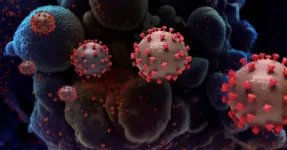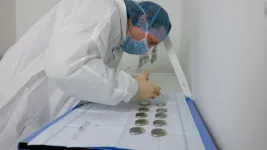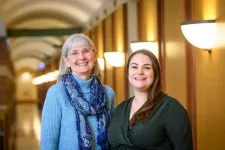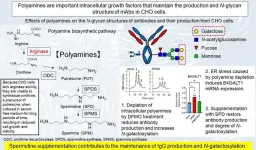(Press-News.org) The Aston Institute for Membrane Excellence (AIME) will be set up with a £10m grant from Research England
AIME will be led by Professor Roslyn Bill from Biosciences and Professor Paul Topham from Chemical Engineering and Applied Chemistry
The globally unique institute will use biomimetic polymer membranes for applications such as water purification and drug development
Aston University will establish the Aston Institute for Membrane Excellence (AIME), a globally unique, cross-disciplinary institute to develop novel biomimetic membranes, after receiving a major grant of £10m from Research England.
AIME will be led by Professor Roslyn Bill, from the School of Biosciences, with co-lead Professor Paul Topham from the department of Chemical Engineering and Applied Chemistry (CEAC).
Membranes, both biological and synthetic, are hugely important in many sectors. For example, the world’s top ten selling human medicines all target proteins in biological membranes, while synthetic polymer membranes are used in the US$100bn/year water purification industry. The team behind AIME believes that the full potential of membranes will only be realised by an interdisciplinary group spanning biology, physics and chemistry that can investigate membranes holistically.
Professor Bill, a European Research Council (ERC) Advanced grantee leads Aston Membrane Proteins and Lipids (AMPL) research centre of excellence that studies the structure and function of membrane proteins and associated lipids. Professor Topham leads Aston Polymer Research Group (APRG), which investigates the nanoscale behaviour of block copolymers (a type of polymer with a structure made of more than one type of polymer molecule) and polymer technologies for membranes. AMPL and APRG have already begun collaborative research and AIME will bring together the complementary expertise of both research clusters into one institute.
AIME will initially comprise the eight researchers from AMPL and APRG. Alongside the co-leads Professor Bill and Professor Topham, will be Dr Alan Goddard, Professor Andrew Devitt, Professor Corinne Spickett, Dr Alice Rothnie, Dr Matt Derry and Dr Alfred Fernandez. It plans to recruit three further academics, six tenure-track research fellows, three postdoctoral research assistants (PDRAs), six PhD students, a research technician and a business development manager. Importantly, AIME will work with many existing Aston University colleagues to build a comprehensive research community focused on all aspects of membrane science.
The new AIME team will focus on the development of bioinspired, highly selective polymer structures for applications in water purification and waste remediation, nanoparticles loaded with therapeutic molecules to treat disorders ranging from chronic wounds to neurological injuries, and the purification of individual membrane proteins with polymers to study them as drug targets.
The vision is for AIME to become a ‘one-stop shop’ for interdisciplinary, translational membrane research through its facilities access and expertise, ideally located in the heart of the country.
Professor Bill said:
“The creation of AIME is ground-breaking. Together with Aston’s investment, E3 funding will deliver a step-change in scale and the rate at which we can grow capacity. We will address intractable scientific challenges in health, disease, and biotechnology, combining our world-class expertise in polymer chemistry and membrane biology to study membranes holistically. The excellence of our science, alongside recent growth in collaborative successes means we have a unique opportunity to deliver AIME’s ambitious and inclusive vision.”
Professor Topham said:
“We are really excited by this fantastic opportunity to work more closely with our expert colleagues in Biosciences to create advanced technology to address real world problems. From our side, we are interested in molecular engineering, where we control the molecular structure of new materials to manipulate their properties to do the things that we want! Moreover, we are passionate about a fully sustainable future for our planet, and this investment will enable us to develop technological solutions in a sustainable or ‘green’ way.”
Professor Aleks Subic, Vice-Chancellor and Chief Executive of Aston University, says:
“Our new Aston Institute for Membrane Excellence (AIME) will be a regional, national, and international research leader in membrane science, driving game-changing research and innovation that will produce a pipeline of high-quality research outcomes leading to socioeconomic impact, develop future global research leaders, create advanced tech spinout companies and high value-added jobs for Birmingham and the West Midlands region. Its establishment aligns perfectly with our 2030 strategy that positions Aston University as a leading university of science, technology and enterprise.”
Steven Heales, Policy Manager (Innovation) at the West Midlands Combined Authority, said:
“WMCA is delighted to see Research England back the Aston Institute for Membrane Excellence. This will enable Aston University’s excellent academics and research community to work closely with businesses to make advances in membrane technology and applications.
“In 2023 the West Midlands Combined Authority agreed a Deeper Devolution Trailblazer Deal with Government, which included a new strategic innovation partnership with Government. Projects like AIME are exactly the kind of impact we expect this new partnership to generate, so watch this space.”
Lisa Smith, chief executive of Midlands Mindforge, the patient capital investment company formed by eight Midlands research-intensive universities including Aston University, said:
“This grant is an important vote of confidence in the Midlands scientific R&D ecosystem. AIME will play an important role in the future research of pioneering breakthroughs in membrane science and enable the world-leading research team at Aston University to develop solutions to real world problems. We look forward to closely working with the Institute and nurturing best-in-field research being undertaken at Aston out of the lab and into the wider society so it can make a positive impact”.
Rob Valentine, regional director of Bruntwood SciTech, the UK’s leading developer of city-wide innovation ecosystems and specialist environments and a strategic partner in Birmingham Innovation Quarter, said:
"As a proud supporter of the Aston Institute for Membrane Excellence (AIME), I am thrilled at the launch of this groundbreaking initiative. AIME exemplifies Aston University's commitment to advancing cutting-edge interdisciplinary research and further raises the profile of the region’s exemplary research capabilities and sector specialisms.
“AIME's vision of becoming a 'one-stop shop' for translational membrane research, strategically located at the heart of the country, aligns perfectly with our strategy at Bruntwood SciTech. We are committed to working with partners, including Aston University, to develop a globally significant innovation district at the heart of the UK where the brightest minds and most inspiring spaces will foster tomorrow’s innovation.”
Membrane research at Aston University has also recently received two other grants. In November 2023, Professor Bill received £196,648 from the Biotechnology and Biological Sciences Research Council’s Pioneer Awards Scheme to understand how tiny membrane water channels in brain cells keep brains healthy. In December 2023, a team led by AIME team-member Dr Derry received £165,999 from the Engineering and Physical Sciences Research Council to develop biomimetic membranes for water purification.
For more information about AIME, visit the webpage.
END
Aston University receives £10m from Research England to establish the Aston Institute for Membrane Excellence
2024-01-16
ELSE PRESS RELEASES FROM THIS DATE:
Innovative COVID-19 analysis supports prevention protocols in health care settings
2024-01-16
In early 2020, severe acute respiratory syndrome coronavirus 2 (SARS-CoV-2), a highly contagious and pathogenic virus, made its alarming debut and quickly spread worldwide, causing the novel coronavirus (COVID-19) pandemic that threatened human health and public safety. While the world was brought to a standstill, hospitals and health care systems entered unchartered territory and quickly adapted to the evolving health crisis to care for their community and keep potentially sick patients and health care workers from spreading the virus.
The magnitude of response involved the reinforced universal masking of health care ...
New study mapping entire genome of oral stem cells opens new doors for regenerative medicine
2024-01-16
Cambridge, Mass., Jan. 16, 2024 - A team of researchers from the ADA Forsyth Institute and University of North Carolina (UNC), Chapel Hill used single-cell transcriptomic analysis to successfully map dental pulp stem cells (DPSC) and periodontal ligament stem cells (PDLSC) and found remarkable differences between them. The study, which appeared in the Journal of Dental Research, provides the most detailed analysis of these stem cells to date, identifying the entire genome of the stem cells and their potential differentiation trajectories.
“Dental pulp and periodontal ligament stem cells both have the potential to develop into any type of cell in the body,” ...
Do violent video games numb us towards real violence?
2024-01-16
Neuroscientists from the University of Vienna and the Karolinska Institute in Stockholm have investigated whether playing violent video games leads to a reduction in human empathy. To do this, they had adult test subjects play a violent video game repeatedly over the course of an experiment lasting several weeks. Before and after, their empathic responses to the pain of another person were measured. It was found that the violent video game had no discernible effect on empathy and underlying brain activity. These results have now been published in the renowned journal eLife.
Video games have become an integral part of the everyday life of many ...
Novel AI platform matches cardiologists in detecting rheumatic heart disease
2024-01-16
WASHINGTON (Jan. 16, 2024) – Artificial intelligence (AI) has the potential to detect rheumatic heart disease (RHD) with the same accuracy as a cardiologist, according to new research demonstrating how sophisticated deep learning technology can be applied to this disease of inequity. The work could prevent hundreds of thousands of unnecessary deaths around the world annually.
Developed at Children’s National Hospital and detailed in the latest edition of the Journal of the American Heart Association, the new AI system combines the power of novel ultrasound probes with portable electronic ...
Researchers examine accuracy of adult body weight estimates in the emergency department
2024-01-16
Knowing a patient’s weight is necessary for many weight-based medications such as thrombolytics, anticoagulants and numerous cardiovascular medications. Scaling drugs to a patient’s weight prevents adverse events from overtreatment and treatment failure due to underdosing. Inaccurate weight estimations may lead to inaccurate drug doses, which could cause patient harm.
However, in the emergency department (ED) during resuscitative care, measuring weight is often impossible. Moreover, little is known about the relative accuracy of different methods currently used to weigh patients during emergency care. For example, ...
Conscience announces first success in open science challenge to predict “hits” for Parkinson’s disease drugs
2024-01-16
TORONTO (16 January 2024) – As part of its pioneering approach to drug discovery, the Canadian nonprofit Conscience announced today that its first open science competition has resulted in the identification of seven promising molecules, or “hits,” that show potential for new, more effective drugs for familial Parkinson’s disease.
This first competition in Conscience’s CACHE (Critical Assessment of Computational Hit-Finding Experiments) Challenge series was funded by The ...
Can recycled pacemakers from the U.S. save lives overseas? Study seeks to find out
2024-01-16
From inside an operating room in Barquisimeto, Venezuela, electrophysiologist Maria Milagros Arends, M.D., threads wires from a pacemaker through the veins and into the heart muscle of a patient.
This pacemaker, which regulates the heartbeat and can be lifesaving, was once in the body of another person. It has been recycled, or “reconditioned”— donated, tested, sterilized and shipped from the United States to the South American country for implantation.
“We have a waiting list of around 300 people who could potentially lose their lives in less than a month,” ...
Higher acetaminophen intake in pregnancy linked to attention deficits in young children
2024-01-16
CHAMPAIGN, Ill. — A new study links increased use of acetaminophen during pregnancy – particularly in the second trimester – to modest but noticeable increases in problems with attention and behavior in 2-, 3- and 4-year-olds. The study adds to a growing body of evidence linking the frequent use of acetaminophen in pregnancy to developmental problems in offspring.
The findings are detailed in the journal Neurotoxicology and Teratology.
The research is part of the Illinois Kids Development Study at the University of Illinois Urbana-Champaign, which explores how environmental ...
Manipulating polyamines to enhance antibody efficacy: A novel approach in biotechnology
2024-01-16
Monoclonal antibodies (mAbs) are laboratory-designed proteins that mimic the immune system's antibodies. To date, many therapeutic mAbs belonging to the immunoglobulin G (IgG) class of antibodies, have been approved for the treatment of cancer and autoimmune diseases. Cell lines such as the Chinese hamster ovary (CHO) cells are generally used to produce mAbs. Notably, the production and manufacture of mAbs are regulated by critical quality attributes (CQAs) to ensure their safety and efficacy in treatment.
An important CQA for mAbs is the N-linked glycosylation present at a specific position (Asn297). N-linked glycans consist of N-acetylglucosamine (GlcNAc), mannose (Man), fucose ...
New initiative focuses on oral health clinicians in prevention and early detection of heart disease
2024-01-16
DALLAS, JANUARY 16, 2024 — A patient’s oral health can be an indicator of overall health and well-being. Research shows that chronic gum inflammation may be associated with other chronic diseases including coronary artery disease and diabetes.[1] In addition, certain bacteria that live in the mouth can travel through the bloodstream to other parts of the body, including the heart and lungs. Oral bacteria, including viridans group streptococcal (VGS), can cause infective endocarditis, an infection of the inner ...





